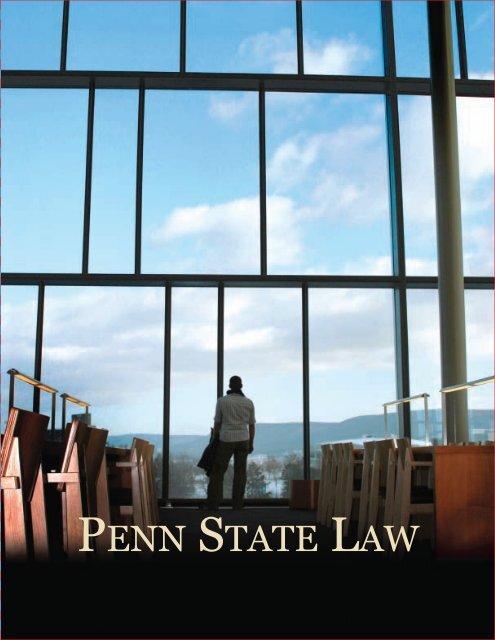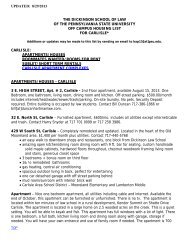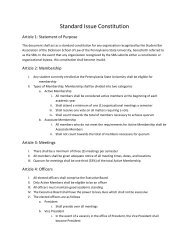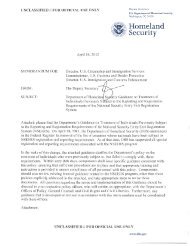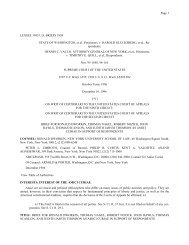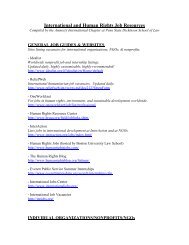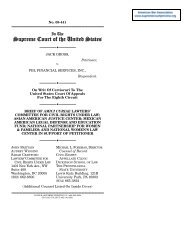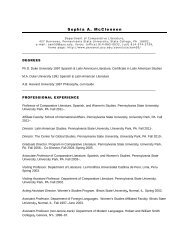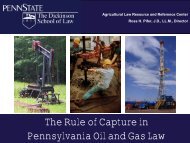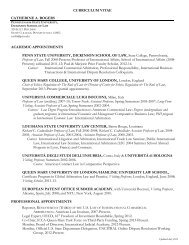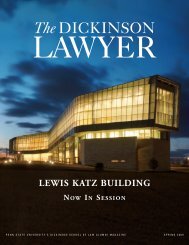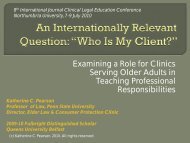View a J.D. Bulletin - Penn State Law - Penn State University
View a J.D. Bulletin - Penn State Law - Penn State University
View a J.D. Bulletin - Penn State Law - Penn State University
You also want an ePaper? Increase the reach of your titles
YUMPU automatically turns print PDFs into web optimized ePapers that Google loves.
PENN STATE LAW
A Message from the Dean<br />
<strong>Penn</strong> <strong>State</strong> <strong>Law</strong> is a school like no other you will encounter in<br />
your law school search. In many ways we are new. <strong>Penn</strong> <strong>State</strong><br />
<strong>University</strong> has invested more than $150 million over the past few<br />
years in distinguished faculty appointments, new signature facilities,<br />
innovative technology, a new international affairs program,<br />
and exciting new clinics for the <strong>Law</strong> School. This has resulted in a<br />
J.D. program that gives our students the skills and the experiences<br />
they need to stand out in an increasingly competitive global<br />
legal marketplace. <strong>Penn</strong> <strong>State</strong> <strong>Law</strong> students can:<br />
• Study with outstanding scholars that include preeminent<br />
experts on DNA and statistical evidence, mergers and acquisitions,<br />
arbitration, international human rights, national security,<br />
antitrust, global legal practice, and other areas essential to the<br />
practice of law in today’s world;<br />
• Participate in the trials of alleged international war crimes<br />
under the chief prosecutor for the International Criminal Tribunal<br />
for the former Yugoslavia at The Hague, in the <strong>Law</strong> School’s<br />
International Criminal Justice semester or summer-long externship<br />
program;<br />
• Take cases from petitions for certiorari to argument in the<br />
U.S. Courts of Appeals and the U.S. Supreme Court in the <strong>Law</strong><br />
School’s Civil Rights Appellate Clinic;<br />
• Collaborate with law students in Cape Town, London, Sydney,<br />
British Columbia and elsewhere via the <strong>Law</strong> School’s stateof-the-art,<br />
high-definition AV-equipped classrooms;<br />
• Undertake joint degree programs with <strong>Penn</strong> <strong>State</strong>’s toprated<br />
graduate programs in business, communications, international<br />
affairs, and other important disciplines.<br />
These are just a few examples of the opportunities the diverse<br />
and academically gifted students of <strong>Penn</strong> <strong>State</strong> <strong>Law</strong> are able to<br />
pursue. Please take a moment to further acquaint yourself with<br />
<strong>Penn</strong> <strong>State</strong> <strong>Law</strong> in this brochure and on our website at law.psu.edu.<br />
Please don’t hesitate to contact our admissions professionals at<br />
admissions@law.psu.edu for further information. We look forward<br />
to hearing from you.<br />
2 <strong>Penn</strong> <strong>State</strong> <strong>Law</strong> law.psu.edu<br />
law.psu.edu
Lewis Katz Building<br />
<strong>University</strong> Park, PA
“Nothing is more frustrating than wrestling with an idea. Nothing is more exhilarating<br />
than pinning it down. The ability to think rigorously, critically, and<br />
creatively is the most important skill a lawyer can have; there is no close second.<br />
The most important educational function a law school can serve is to<br />
improve the mental dexterity of its students. At <strong>Penn</strong> <strong>State</strong> <strong>Law</strong>, we will repeatedly<br />
throw you onto the mat with new, complicated ideas. The prospect<br />
is unsettling. If you are afraid of the contest, this is not the place for you; but<br />
if you are excited by it and embrace it, you will thrive.”<br />
Professor John Lopatka<br />
A. Robert Noll Distinguished Professor of <strong>Law</strong><br />
Antitrust, economic analysis of law, and torts scholar<br />
DEGREES<br />
<strong>Penn</strong> <strong>State</strong> <strong>Law</strong> offers a juris doctor (J.D.) and, for<br />
foreign-trained attorneys, an LL.M. Engaging the resources<br />
of a major research university, the <strong>Law</strong> School<br />
offers more than a dozen dual master’s or Ph.D. programs<br />
including:<br />
J.D./M.B.A. with the Smeal College of Business<br />
J.D./Master of International Affairs<br />
J.D./M.Ed. or Ph.D. with College of Education<br />
J.D./M.S. or Ph.D. with College of Agricultural Sciences<br />
And opportunities for interdisciplinary study with other<br />
<strong>Penn</strong> <strong>State</strong> programs.<br />
2PENN STATE LAW law.psu.edu
How will I be challenged at <strong>Penn</strong> <strong>State</strong> <strong>Law</strong>?<br />
“Scientific methods in criminal cases — things like fingerprinting and lie<br />
detection — have limitations that you would not know about from watching<br />
CSI and other TV shows... In addition to improving students’ legal analysis<br />
skills, my classes expose students to nonlegal modes of thought — probability,<br />
statistics, and inductive reasoning. <strong>Law</strong>yers need not be experts in these<br />
methods, but I hope that my students come away with the ability to make<br />
sense of an empirical study and to recognize the assumptions behind it.”<br />
Professor David Kaye<br />
Distinguished Professor of <strong>Law</strong> and Weiss Family Faculty Scholar<br />
Legal expert on DNA and other forms of scientific evidence<br />
“The transformation from student to lawyer in three years requires almost<br />
constant immersion in the law. <strong>Penn</strong> <strong>State</strong> <strong>Law</strong> students do study alone,<br />
but most of the time they are together in the library, classrooms, and<br />
common areas engaged in continuous conversation about law.”<br />
Professor Marie Reilly<br />
Associate Dean for Academic Affairs and Professor of <strong>Law</strong><br />
Bankruptcy and commercial law scholar<br />
“I want my students to be more than mergers and acquisitions and tax<br />
lawyers; I want them to learn to think critically as business lawyers. My<br />
classes help students prepare for everything business lawyers are likely to<br />
encounter, whether it’s on Wall Street in New York, LaSalle Street in Chicago,<br />
or Broad Street in Philadelphia.”<br />
Professor Samuel Thompson Jr.<br />
Arthur Weiss Distinguished Faculty Scholar and Professor of <strong>Law</strong><br />
Director, <strong>Penn</strong> <strong>State</strong>’s Center for the Study of Mergers and Acquisitions<br />
Corporate and international tax, corporate governance, and antitrust scholar<br />
<strong>Penn</strong> <strong>State</strong> <strong>Law</strong> law.psu.edu 3
ACADEMICS<br />
<strong>Penn</strong> <strong>State</strong> <strong>Law</strong> gives each student a solid foundation in the law. During their first year,<br />
students gain core knowledge and basic skills. In the second and third year, students<br />
may concentrate their study in numerous specialized fields, including business law;<br />
arbitration, mediation and negotiation; and international and transnational law.<br />
What will I encounter in the classroom?<br />
“I am committed to teaching and trying to use the law to make a difference in the<br />
lives of real people. When I come into the classroom each day, my goal is to engage<br />
my students and encourage them to participate in the discussion so that they can<br />
teach themselves and each other how to ‘think like lawyers.’ The cases and policy<br />
questions we discuss in class are designed not only to teach a particular set of legal<br />
rules, but also to enable students to read, understand, and analyze legal materials<br />
in any subject area.”<br />
Professor Kit Kinports<br />
Polisher Family Distinguished Faculty Scholar and Professor of <strong>Law</strong><br />
Feminist jurisprudence, criminal law, and federalism scholar<br />
“Beyond just teaching us the law, we were encouraged to take our thinking to the<br />
next level, to understand the intent behind the law, why it operates the way it does,<br />
and how it may change given the current political landscape. In our constantly<br />
changing legal environment, nothing could have better prepared me for work at a<br />
firm.”<br />
Jake Mattinson ’12<br />
Brigham Young <strong>University</strong><br />
Associate, McDermott Will & Emery<br />
Chicago, Illinois<br />
4 <strong>Penn</strong> <strong>State</strong> <strong>Law</strong> law.psu.edu
CENTERS<br />
<strong>Penn</strong> <strong>State</strong> is ninth among all U.S. universities in<br />
research expenditures.<br />
The Agricultural <strong>Law</strong> Resource and Reference Center focuses<br />
on issues in agriculture including food and energy supplies.<br />
The Center for Government <strong>Law</strong> and Public Policy Studies<br />
connects students with government agencies and nonprofit<br />
public policy organizations at the state and national levels.<br />
The Center for the Study of Mergers and Acquisitions examines<br />
corporate, securities, tax, antitrust, and other legal and<br />
economic issues that arise in mergers and acquisitions.<br />
The Center on Children and the <strong>Law</strong> provides a collaborative,<br />
multidisciplinary hub for research, teaching, outreach, and<br />
service on children’s issues that intersect with the law.<br />
The Institute of Arbitration <strong>Law</strong> and Practice promotes the<br />
study and scholarship of arbitration law.<br />
The Institute for Sports <strong>Law</strong>, Policy, and Research promotes<br />
dialogue with major industry participants in areas like antitrust,<br />
history, and intercollegiate sports.<br />
The Center for Public Interest <strong>Law</strong> and Advocacy connects law<br />
students with pro bono research opportunities.<br />
Photographer: Albert Vecerka/ESTO<br />
PENN STATE LAW law.psu.edu 5
Will I learn new ways of resolving disputes and practicing law?<br />
“Arbitration is seen by the court, both internationally and domestically, as a necessary<br />
form of ersatz justice that provides for an effective rule of law that is less and less<br />
available in the adversarial trial. My students are prepared to counsel clients on the<br />
availability of remedies and to demonstrate to their clients how responsive particular<br />
remedies are to their specific needs and interests. It is a relatively new form of<br />
lawyering for modern-day America; it is certainly a new form of justice dictated by<br />
the new exigencies of the twenty-first century.”<br />
Professor Thomas Carbonneau<br />
Samuel P. Orlando Distinguished Professor of <strong>Law</strong><br />
Director, <strong>Penn</strong> <strong>State</strong>’s Institute of Arbitration <strong>Law</strong> and Practice<br />
International and domestic arbitration scholar<br />
“<strong>Penn</strong> <strong>State</strong> <strong>Law</strong> gives you everything you need to start your career as an advocate.<br />
The substantive courses give you a foundation from which to build your knowledge<br />
of the law, and the advocacy program provides you with the tools, practice, and feedback<br />
needed to feel comfortable and confident in the courtroom. During Advocacy<br />
you put to use everything you learned during the first year in a real courtroom using<br />
a case file just like in practice, and you get feedback from experienced litigators to<br />
help you improve your skills. Externship opportunities give you the chance to work<br />
hand-in-hand with practicing attorneys and argue real cases. With the combination<br />
of excellent professors, an incredible hands-on advocacy program, and externship<br />
opportunities, you don't just learn the law; you learn how to be a lawyer.”<br />
Benjamin Ellis ’12<br />
<strong>University</strong> of Georgia<br />
Intern, Public Defender Office<br />
Cumberland County, <strong>Penn</strong>sylvania<br />
MOOT COURT COMPETITIONS<br />
<strong>Penn</strong> <strong>State</strong> <strong>Law</strong> students compete in a variety of moot court and oral advocacy<br />
competitions across the country and internationally, including:<br />
National Black <strong>Law</strong> Students Association Frederick Douglass Moot<br />
Court Competition<br />
John J. Gibbons National Criminal Procedure Moot Court Competition<br />
International <strong>Law</strong> Students Association Philip C. Jessup International<br />
<strong>Law</strong> Moot Court Competition<br />
National Environmental <strong>Law</strong> Moot Court Competition<br />
Tulane <strong>Law</strong> School Moot Court Mardi Gras Invitational Sports <strong>Law</strong><br />
Competition<br />
Robert F. Wagner National Labor and Employment <strong>Law</strong> Moot Court<br />
Competition<br />
The Annual Willem C. Vis International Commercial Arbitration Moot<br />
The American Bar Association National Appellate Advocacy Competition<br />
NATIONAL TRIAL COMPETITIONS<br />
<strong>Penn</strong> <strong>State</strong> <strong>Law</strong> students have the opportunity to develop and<br />
hone their advocacy skills through faculty-directed participation in<br />
a variety of national, local, and intra-school mock trial competitions.<br />
The top student advocates, selected from the intra-school<br />
competition, are invited to represent the <strong>Law</strong> School in a number<br />
of national mock trial competitions, including:<br />
National Trial Competition, hosted by the American<br />
College of Trial <strong>Law</strong>yers<br />
Trial Advocacy Competition, hosted by the American<br />
Association for Justice<br />
6 <strong>Penn</strong> <strong>State</strong> <strong>Law</strong> law.psu.edu
“Upon entering the <strong>Law</strong><br />
School’s mock courtroom,<br />
the students’ sense of awe<br />
is palpable. They start behaving<br />
like lawyers the<br />
moment they set foot in<br />
the courtroom.”<br />
Professor Gary Gildin<br />
The Honorable G. Thomas<br />
and Anne G. Miller Chair in<br />
Advocacy and Professor of <strong>Law</strong><br />
Litigator, trial advocacy expert,<br />
and civil and religious liberties<br />
scholar<br />
PENN STATE LAW law.psu.edu 7
INTERNATIONAL STUDY<br />
<strong>Penn</strong> <strong>State</strong> <strong>Law</strong> is unique in its curricular integration with <strong>Penn</strong> <strong>State</strong>’s graduate School of International<br />
Affairs. The legal profession may be contracting somewhat in the United <strong>State</strong>s, but it is<br />
growing exponentially abroad. Students benefit from the unmatched depth in international law<br />
and affairs of our two faculties, an array of international law and international affairs classes,<br />
and opportunities to study internationally. J.D. students serve as mentors and attend classes<br />
with LL.M. students who are typically foreign-trained lawyers, creating excellent opportunities<br />
for cultural exchange.<br />
Our advanced AV technology allows students to join peers at other universities around the<br />
world. Top law practice today demands knowledge of the rules and practices that govern<br />
transnational affairs, and there is no place better than <strong>Penn</strong> <strong>State</strong> <strong>Law</strong> to gain that knowledge.<br />
“Tremendous forces of change are creating a growing need for professionals who<br />
can function effectively in the realm of international affairs. Interdisciplinary learning<br />
is one of the hallmarks of the <strong>Penn</strong> <strong>State</strong> School of International Affairs, and we<br />
are pleased to help <strong>Penn</strong> <strong>State</strong> <strong>Law</strong> students supplement their study by offering<br />
graduate-level electives as well as a joint J.D./M.I.A. degree.”<br />
Professor Tiyanjana Maluwa<br />
Associate Dean for International Affairs and H. Laddie Montague Chair in <strong>Law</strong><br />
Director, School of International Affairs<br />
“As I became more interested in the study and practice of international law, I realized<br />
that the J.D./M.I.A. dual degree program at <strong>Penn</strong> <strong>State</strong> would give me the ability<br />
to not only understand the legal aspects of international conflicts, but also the<br />
policy and theoretical aspects. The tools that I have developed through this program<br />
have helped me not only in internships with large international law firms, but also<br />
with U.S. government agencies.”<br />
Christopher Stromberg ’13<br />
Brigham Young <strong>University</strong><br />
J.D./M.I.A. Program<br />
Summer Associate, Egorov, Puginsky and Partners<br />
St. Petersburg, Russia<br />
8 <strong>Penn</strong> <strong>State</strong> <strong>Law</strong> law.psu.edu
“<strong>Law</strong> practice is no longer only a local or even a<br />
national activity. A majority of the top ten law firms<br />
have more attorneys in foreign offices than in their<br />
U.S. offices, and even small and medium-sized law<br />
firms are actively providing legal services on a global<br />
scale. Particularly with the current turmoil in the<br />
job market, law graduates who are able to operate<br />
in an international environment will dramatically<br />
increase their professional options.”<br />
Professor Catherine Rogers<br />
Paul and Marjorie Price Faculty Scholar<br />
and Professor of <strong>Law</strong><br />
<strong>Penn</strong> <strong>State</strong> <strong>Law</strong> law.psu.edu 9
INTERNATIONAL PROGRAMS<br />
Students can build international experiences through both classroom and extracurricular<br />
programs. <strong>Penn</strong> <strong>State</strong> <strong>Law</strong> has exchange partnerships with universities in Africa, Europe,<br />
and Asia. Students can compete in international law and commercial arbitration moot<br />
court events or research and write for the <strong>Penn</strong> <strong>State</strong> Journal of <strong>Law</strong> and International<br />
Affairs. The International Justice Externship places students side-by-side with senior<br />
prosecutors at the International Court of Justice at The Hague, Netherlands participating<br />
in some of today’s most significant international criminal cases.<br />
“Interning at the International Criminal Tribunal for the former Yugoslavia has<br />
made human rights real. We are helping to bring voice to the victims who lived<br />
through crimes against humanity by bringing their perpetrators to justice.”<br />
Sarah Hart ’12<br />
Gettysburg College<br />
Legal Intern, Office of the Prosecutor, ICTY<br />
Worked on the joint prosecution of Franko Simatovic<br />
and Jovica Stanisic and Ratko Mladic<br />
World on Trial is an educational television and interactive web series that<br />
brings together the best legal talent in the world to argue both sides of sharply<br />
contested human rights issues. Students develop the background cases and<br />
handle much of the legal research required to bring the program to life.<br />
Professor Randall Robinson, who conceived of and hosts the program, offers<br />
a seminar course in the enforcement of international human rights treaties<br />
as well.<br />
10 PENN STATE LAW law.psu.edu
JOURNALS<br />
Journal service provides student members<br />
an invaluable experience both in<br />
substantive law and skills in research,<br />
analysis, and expression. In addition to<br />
researching and writing their own articles,<br />
students work closely with leading<br />
academics on their scholarly articles.<br />
<strong>Penn</strong> <strong>State</strong> <strong>Law</strong> students edit and publish<br />
three scholarly journals.<br />
<strong>Penn</strong> <strong>State</strong> <strong>Law</strong> Review<br />
<strong>Penn</strong> <strong>State</strong> Journal of <strong>Law</strong> and International Affairs<br />
The Yearbook on Arbitration and Mediation<br />
<strong>Penn</strong> <strong>State</strong> <strong>Law</strong> law.psu.edu 11
EXPERIENTIAL LEARNING<br />
<strong>Penn</strong> <strong>State</strong> <strong>Law</strong> students learn by experience while advocating for underrepresented<br />
people and participating in the legal and political process through in-house clinics and<br />
externship opportunities, including the Semester in Washington, D.C. and Semester in<br />
Harrisburg programs.<br />
“The mission of the Center for Immigrants’ Rights is to represent immigrants’ interests<br />
through advocacy, education, and collaboration with key stakeholders and the<br />
community. For students to become effective immigration advocates and attorneys,<br />
they must have a combined understanding and appreciation for immigration law,<br />
policy, and politics, and the relationships among them.”<br />
Professor Shoba Sivaprasad Wadhia<br />
Clinical Professor and Director, Center for Immigrants’ Rights<br />
CLINICS<br />
Arts, Sports and Entertainment <strong>Law</strong> Clinic: Students provide<br />
legal counsel on issues of intellectual property, contracts,<br />
licensing, and merchandising endorsement to clients in the<br />
arts, sports, and entertainment fields.<br />
Center for Immigrants’ Rights: Students advance the interest<br />
of immigrants through education and collaboration with<br />
stakeholders in the community while providing legal assistance<br />
to immigration detainees in <strong>Penn</strong>sylvania.<br />
Children’s Advocacy Clinic: Students represent children in<br />
adoption, custody, dependency, and domestic violence<br />
matters while providing legislative and policy advocacy for<br />
child welfare issues.<br />
Civil Rights Appellate Clinic: Students research and write<br />
briefs for appellate civil rights cases in state and federal<br />
courts of appeal in collaboration with national civil rights<br />
organizations and leading law firms.<br />
Community <strong>Law</strong> Clinic: Students provide legal help for people<br />
in central <strong>Penn</strong>sylvania who are having problems related<br />
to family matters, disability, and other areas of law as appropriate.<br />
Family <strong>Law</strong> Clinic: Students represent clients in matters of<br />
divorce, child custody, child support, spousal support,<br />
protection from abuse, and related issues.<br />
International Sustainable Development Projects Clinic:<br />
Students collaborate with multidisciplinary project teams<br />
and/or social entrepreneurs to implement humanitarian<br />
engineering projects and build “triple bottom line” businesses<br />
(measuring success by profit, as well as their effect on people<br />
and planet) in the developing world.<br />
Rural Economic Development Clinic: Students represent<br />
agricultural producers, businesses, and landowners on a<br />
range of transactional activities, including contract review<br />
and development, within the agricultural, food, and energy<br />
law areas.<br />
12 <strong>Penn</strong> <strong>State</strong> <strong>Law</strong> law.psu.edu
“My experience at the Civil Rights Appellate Clinic was amazing.<br />
Since the U.S. Supreme Court only hears about 1 percent of the<br />
cases presented to it, we knew that getting the Court to grant certiorari<br />
in the Coleman case was a daunting task. I think our belief<br />
in our case showed in our writing. The opportunity to watch Professor<br />
Foreman put all of our hard work into play in front of the<br />
Supreme Court was incredible.”<br />
Kathleen Wagner ’12<br />
<strong>University</strong> of Rochester<br />
Intern, Civil Rights Appellate Clinic<br />
CIVIL RIGHTS APPELLATE CLINIC<br />
Recently the clinic joined as co-counsel<br />
in Coleman v. Maryland Court of Appeals<br />
and was successful in getting Mr. Coleman’s<br />
petition for certiorari granted.<br />
Under the supervision of Professor<br />
Michael Foreman, second- and third-year<br />
law students drafted and filed petitioner’s<br />
merits brief and reply to respondent’s<br />
brief. Then, the students helped Professor<br />
Foreman prepare for his oral argument<br />
before the Court.<br />
<strong>Penn</strong> <strong>State</strong> <strong>Law</strong> law.psu.edu 13
“My internship at the Department of Justice Tax Division allowed<br />
me to work with the brightest minds in tax law and to see how tax<br />
law is applied at the federal level.”<br />
Thomas Hill ’11<br />
<strong>Penn</strong> <strong>State</strong> <strong>University</strong><br />
Tax Associate, PricewaterhouseCoopers<br />
Washington, DC<br />
EXTERNSHIPS<br />
Under the guidance of an experienced advisor, <strong>Penn</strong> <strong>State</strong> <strong>Law</strong> students gain<br />
valuable practical experience working in a wide range of externships with<br />
state or federal government agencies and public interest or nonprofit organizations.<br />
Externship placements include:<br />
Federal Energy Regulatory Commission<br />
National Labor Relations Board<br />
U.S. Attorney’s Offices<br />
U.S.-China Economic Review and Security Commission<br />
U.S. Department of Homeland Security<br />
U.S. Department of Justice<br />
U.S. Department of Treasury<br />
U.S. Equal Employment Opportunity Commission<br />
U.S. Securities and Exchange Commission<br />
<strong>Penn</strong> <strong>State</strong> <strong>University</strong> Office of Athletic Compliance<br />
<strong>Penn</strong>sylvania Department of Banking<br />
<strong>Penn</strong>sylvania Department of Environmental Protection<br />
<strong>Penn</strong>sylvania Department of <strong>State</strong><br />
<strong>Penn</strong>sylvania Governor’s Policy Office<br />
14 PENN STATE LAW law.psu.edu
“Working at the Drug Enforcement Administration has been such a rewarding<br />
experience because even smaller assignments that may be considered<br />
‘regular’ cases at a different government agency have interesting<br />
fact patterns and can end up shaping policy for the entire agency. What<br />
appears to be a simple legal research question can affect every single<br />
DEA employee, including agents in the field, locally and abroad.”<br />
Kristina Dahmann ’13<br />
Bowdoin College<br />
Summer <strong>Law</strong> Clerk, Drug Enforcement Administration<br />
PUBLIC INTEREST<br />
The legal profession is unique in that it requires its members to<br />
provide public interest services as a part of their professional<br />
responsibility. <strong>Penn</strong> <strong>State</strong> <strong>Law</strong> students contribute legal expertise<br />
to the community through the Miller Center for Public Interest<br />
Advocacy, public interest fellowships, the Volunteer Income Tax<br />
Assistance program, and other volunteer programs.<br />
“My experience with the Montana Innocence<br />
Project has taught me not to give up. I am inspired<br />
and amazed working with individuals who<br />
maintain their innocence and their optimism for<br />
years on end, despite the seemingly interminable<br />
gauntlet of legal strictures they face.”<br />
Kristi Martel ’13<br />
<strong>University</strong> of Southern California<br />
Summer Intern, Montana Innocence Project<br />
<strong>Penn</strong> <strong>State</strong> <strong>Law</strong> law.psu.edu 15
CAREER PLANNING & DEVELOPMENT<br />
The work of the Career Planning & Development team begins from the moment a student<br />
is admitted to the <strong>Law</strong> School. The focus is to help students identify their strengths,<br />
choose a practice area that best matches their skills, develop a job search strategy and a<br />
marketing plan, and negotiate a position.<br />
Kenny R. Tatum joined the <strong>Law</strong> School in 2011 bringing ten years of legal<br />
recruiting experience in large law firm environments.<br />
“We take a multi-pronged approach. I spend much of my time on the road, ensuring<br />
that employers throughout the country are aware of our exceptionally talented students.<br />
My colleagues work hard to ensure that students have developed the kind of<br />
differentiators that help them stand out with those employers.”<br />
Kenny Tatum<br />
Assistant Dean of Career Planning & Development<br />
“The Career Planning staff members helped me throughout my interview process.<br />
They conducted practice interviews, offered feedback on my résumé and cover letters,<br />
and helped me network with upper-level students who had experience interviewing<br />
for the positions I hoped to secure.”<br />
Angela N. Velez ’11<br />
<strong>University</strong> of Delaware<br />
Associate, Stradley Ronon Stevens & Young, LLP<br />
Philadelphia, <strong>Penn</strong>sylvania<br />
CLASS OF 2011 EMPLOYMENT PROFILE*<br />
Private Practice ........ 41%<br />
Judicial Clerkship ...... 20%<br />
Business/Industry..... 17%<br />
Government ............... 8%<br />
Academic .................... 6%<br />
Public Interest............. 3%<br />
Unknown .................... 3%<br />
Military Government.. 2%<br />
16 <strong>Penn</strong> <strong>State</strong> <strong>Law</strong> law.psu.edu<br />
*Created from a survey administered to the <strong>Penn</strong> <strong>State</strong><br />
<strong>Law</strong> Class of 2011 nine months after graduation. This<br />
data reflects the self-reported employment information<br />
from graduates who obtained employment. To view<br />
more employment data, visit www.law.psu.edu/<br />
employmentdata
MEET A FEW OF OUR ALUMNI<br />
A degree from the world-class <strong>Penn</strong> <strong>State</strong> <strong>University</strong> opens doors to a global network of<br />
alumni and a multitude of career opportunities. As a <strong>Penn</strong> <strong>State</strong> <strong>Law</strong> graduate you will<br />
have access to more than 557,000 alumni and the largest dues-paying alumni association<br />
in the world.<br />
Thomas J. Ridge ’72<br />
CEO, Ridge Global LLC<br />
First Secretary of the U.S. Department<br />
of Homeland Security;<br />
Former Governor of <strong>Penn</strong>sylvania<br />
Lewis Katz ’66<br />
Founder, Katz Ettin & Levine;<br />
Member, Ownership Groups of the<br />
New Jersey Nets, New York Yankees, and<br />
New Jersey Devils<br />
Brian Sheridan ’09<br />
Trial Attorney<br />
U.S. Department of Justice<br />
Washington, D.C.<br />
Rachael Goldfarb ’06<br />
Deputy Chief Technology Officer<br />
Consumer Financial Protection Bureau<br />
Washington, D.C.<br />
Gwenn E. Cujdik ’03<br />
Assistant District Attorney,<br />
Family Violence and Sexual<br />
Assault Unit<br />
Philadelphia, <strong>Penn</strong>sylvania<br />
Jennifer L. Young ’05<br />
Director, International Public &<br />
Government Affairs<br />
Novartis Corporation<br />
Washington, DC<br />
H. Laddie Montague Jr. ’63<br />
Senior Shareholder,<br />
Berger & Montague, P.C.<br />
Philadelphia, <strong>Penn</strong>sylvania<br />
Co-Trial Counsel for Plaintiffs in the<br />
Exxon Valdez Oil Spill Litigation<br />
Jose Fanjul ’08<br />
Assistant District Attorney<br />
New York County District<br />
Attorney’s Office<br />
New York, New York<br />
Zach Brecheisen ’12<br />
Associate, Jones Day<br />
Pittsburgh, <strong>Penn</strong>sylvania<br />
Amy Fernandez ’06<br />
Patent Attorney<br />
Colgate-Palmolive Company<br />
Piscataway, New Jersey<br />
Kimberly Gray ’94<br />
Chief Privacy Officer, IMS Health<br />
Plymouth Meeting, <strong>Penn</strong>sylvania<br />
D. Brooks Smith ’76<br />
Judge, U.S. Court of Appeals<br />
for the Third Circuit<br />
Sylvia H. Rambo ’62<br />
Judge, U.S. District Court<br />
for the Middle District of<br />
<strong>Penn</strong>sylvania<br />
Josh P. Parecki ’04<br />
Assistant U.S. Attorney<br />
U.S. Attorney’s Office<br />
for the District of Arizona<br />
Phoenix, Arizona<br />
Ryan Fleischer ’08<br />
Assistant Director of NCAA Compliance<br />
The College of William and Mary<br />
Williamsburg, Virginia<br />
Thomas I. Vanaskie ’78<br />
Judge, U.S. Court of Appeals<br />
for the Third Circuit<br />
Mariam Elhadri ‘12<br />
Coordinating and Fundraising Officer<br />
<strong>Law</strong>yers for Justice in Libya<br />
London and Tripoli<br />
“Dickinson (School of <strong>Law</strong>)<br />
taught me to be a consummate<br />
professional. The faculty not<br />
only taught me the substantive<br />
things I needed to know but<br />
also how to be a professional.”<br />
Michelle Hylton ’00<br />
Senior Counsel<br />
Turner Broadcasting System<br />
Atlanta, GA<br />
“Not all law schools offer the<br />
combination of theoretical education<br />
and practical experience<br />
necessary to succeed in the dynamic<br />
legal field of Washington<br />
D.C. <strong>Penn</strong> <strong>State</strong> Dickinson <strong>Law</strong><br />
School offered the experience<br />
and the education necessary for<br />
me to succeed as an appellate<br />
attorney in one of the largest<br />
law firms in Washington, D.C.”<br />
Quin Sorenson ’08<br />
Sidley Austin<br />
Washington, DC<br />
“Through my education at <strong>Penn</strong><br />
<strong>State</strong> <strong>Law</strong>, I learned not only<br />
substantive law but also how to<br />
approach a legal problem and<br />
structure an analysis. The faculty<br />
taught me the research and<br />
writing skills necessary to confidently<br />
and effectively communicate<br />
to my clients the pertinent<br />
legal issues.”<br />
Angelica Sinopole ’09<br />
Associate, Sullivan & Cromwell LLP<br />
New York, NY<br />
<strong>Penn</strong> <strong>State</strong> <strong>Law</strong> law.psu.edu 17
DIVERSITY<br />
Diversity enriches every aspect of life at <strong>Penn</strong> <strong>State</strong>, and we support initiatives that foster<br />
understanding and acceptance of differences — differences in thought, background,<br />
age, life experience, gender, race, abilities, religion, and culture. We believe in facilitating<br />
open discussions, integrating diversity into course work, and celebrating our differences.<br />
“As someone who grew up in the Philippines, it’s all too clear to me that<br />
21st century workers — including attorneys — will need to know how to<br />
appreciate, interrogate, and negotiate this increasingly interconnected<br />
world in which we live.”<br />
Professor Victor C. Romero<br />
Maureen B. Cavanaugh Distinguished Faculty Scholar and Professor of <strong>Law</strong><br />
STUDENT ORGANIZATIONS<br />
Reflecting their diverse backgrounds, beliefs, and passions, <strong>Penn</strong> <strong>State</strong> <strong>Law</strong><br />
students explore shared interests and advance common causes through<br />
student organizations that include:<br />
Animal Legal Defense Fund<br />
Asian Pacific American <strong>Law</strong> Students Association<br />
Black <strong>Law</strong> Students Association<br />
Environmental <strong>Law</strong> Society<br />
Federalist Society<br />
International <strong>Law</strong> Society<br />
<strong>Law</strong> and Education Alliance at <strong>Penn</strong> <strong>State</strong><br />
Minority <strong>Law</strong> Students Association<br />
National Security and <strong>Law</strong> Society<br />
Outlaw<br />
Public Interest <strong>Law</strong> Fund<br />
Women’s <strong>Law</strong> Caucus<br />
18 <strong>Penn</strong> <strong>State</strong> <strong>Law</strong> law.psu.edu
THE LAW SCHOOL’S TWO LOCATIONS<br />
In 2000, the <strong>Law</strong> School merged with<br />
one of the world’s great research universities,<br />
<strong>Penn</strong> <strong>State</strong> <strong>University</strong>, in an effort to<br />
better position itself for the highly competitive,<br />
multidisciplinary academic environment<br />
of the 21st century.<br />
In 2008, the <strong>Law</strong> School opened a stunning,<br />
technologically sophisticated building<br />
on <strong>Penn</strong> <strong>State</strong>’s flagship campus in <strong>University</strong><br />
Park, <strong>Penn</strong>sylvania.<br />
The <strong>Law</strong> School retains its presence in<br />
Carlisle as an integral part of the School’s<br />
operation. The Carlisle facilities have been<br />
completely rebuilt, with state-of-the-art<br />
classrooms, conference rooms, and a library<br />
interconnected with the <strong>University</strong><br />
Park campus via the most advanced highdefinition,<br />
digital audiovisual telecommunications<br />
system available.<br />
<strong>Penn</strong> <strong>State</strong> <strong>Law</strong> law.psu.edu 19
LIFE AT PENN STATE<br />
At <strong>Penn</strong> <strong>State</strong> <strong>Law</strong> you can walk, jog, or bike to class.<br />
Safe, pedestrian-friendly neighborhoods are the rule, not<br />
the exception.<br />
Home to approximately 41,000 undergraduate and<br />
graduate students, the <strong>University</strong> Park location offers a<br />
diverse intellectual community. The Carlisle location is<br />
also situated in a campus setting. Central <strong>Penn</strong>sylvania<br />
offers a rich collection of cultural resources, museums<br />
and galleries. Area attractions include the Bryce Jordan<br />
Center, the Giant Center, Hershey Park arena, and<br />
Whitaker Center for Science and Arts, all of which host a variety of popular music artists<br />
and entertainers.<br />
<strong>Penn</strong> <strong>State</strong> athletic teams, sports and recreation activities include the <strong>State</strong> College<br />
Spikes and Harrisburg Senators minor league baseball teams, hiking and biking trails at<br />
scenic state parks, beautifully maintained golf courses, and nearby ski areas.<br />
<strong>Penn</strong> <strong>State</strong> <strong>Law</strong> is located within easy driving distance of Baltimore, Washington, D.C.,<br />
Philadelphia, Pittsburgh, and New York City, so you can enjoy three years of reasonable<br />
rent and a manageable cost of living that will help your bottom line for years to come.<br />
President Barack Obama acknowledges the audience as<br />
he takes the podium in Rec Hall on Thursday, Feb. 3<br />
Photos: Andy Colwell<br />
The dance floor of the Bryce Jordan Center is seen here at the<br />
end of the THON 2011 Line Dance during the morning of Saturday,<br />
Feb. 19, the second day of THON 2011.<br />
One of many sign-bearing fans gets recognized by Bruce<br />
Springsteen during his concert with his E Street Band in<br />
the Bryce Jordan Center on Friday, May 8.
PENN STATE LAW<br />
law.psu.edu<br />
Office of Admissions<br />
800.840.1122 or 814.867.1251<br />
admissions@law.psu.edu<br />
law.psu.edu/admissions<br />
Photos provided by Ian Bradshaw Photography, Albert Vecerka/ESTO,<br />
Matt Gardner, Bill Hench Photography, Peter Olson Photography, Dyanna Stupar, and<br />
<strong>University</strong> Publications.<br />
This publication is available in alternative media on request.<br />
<strong>Penn</strong> <strong>State</strong> is committed to affirmative action, equal opportunity,<br />
and the diversity of its workforce. U.Ed. LAW 13-4
l a w . p s u . e d u


